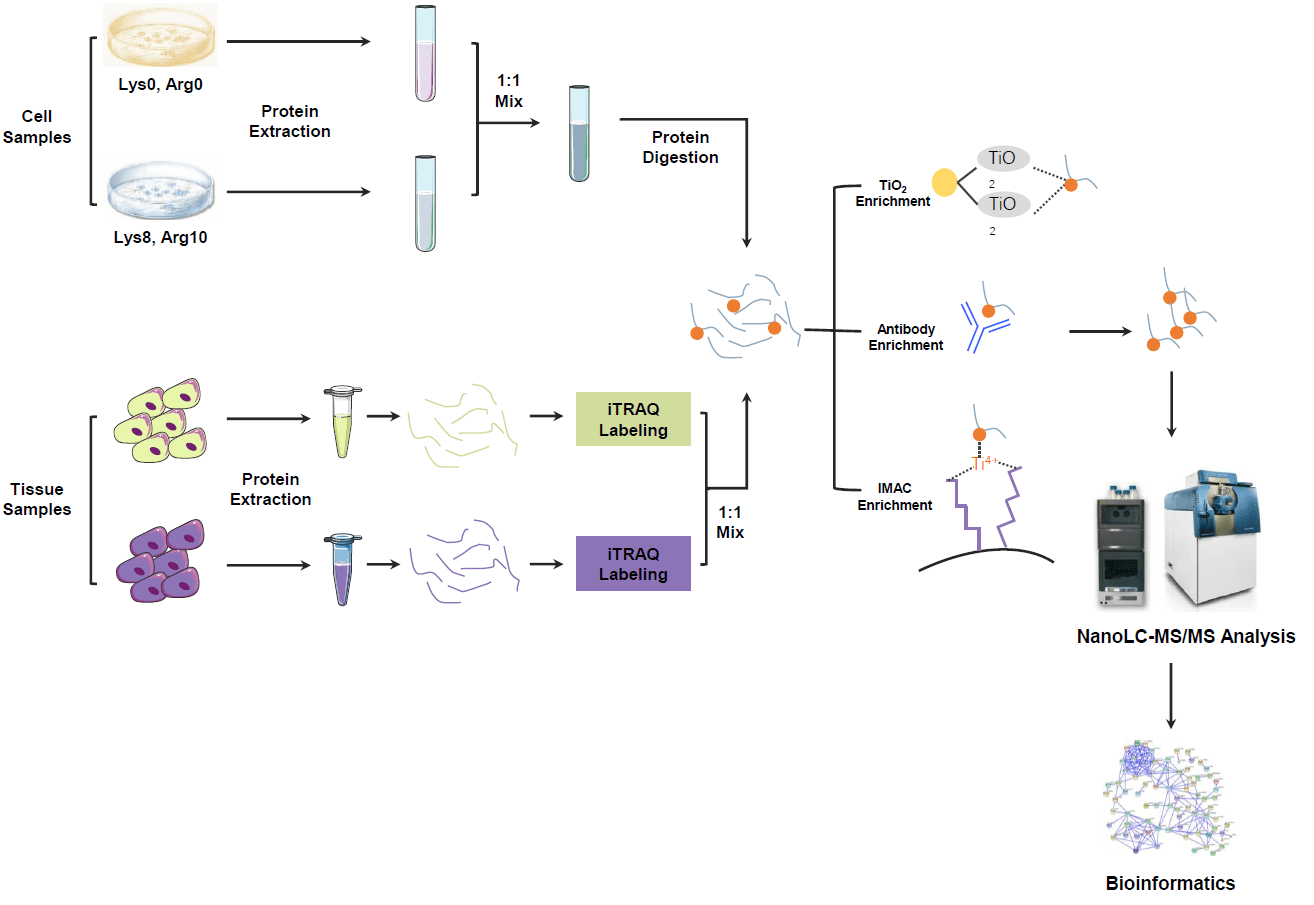Quantitative Phosphoproteomics Service
Quantitative Phosphoproteomics Service at MtoZ Biolabs enables researchers to measure dynamic phosphorylation changes across biological states with high sensitivity and reproducibility. By systematically quantifying phosphorylation on serine, threonine, and tyrosine residues, this service provides precise molecular insights into regulatory pathways, disease mechanisms, and drug responses.
Overview
Phosphorylation is one of the most important post-translational modifications (PTMs) in cells. As a reversible process regulated by kinases and phosphatases, it plays a central role in nearly all cellular activities, including proliferation, differentiation, apoptosis, and immune signaling. Due to the typically low abundance and wide dynamic range of phosphoproteins, selective enrichment and optimized quantification strategies are critical for accurate analysis. Quantitative phosphoproteomics not only identifies phosphorylation sites but also measures their dynamic levels, making it indispensable for understanding complex signaling networks and guiding translational research.
Services at MtoZ Biolabs
MtoZ Biolabs provides Quantitative Phosphoproteomics Service through a fully integrated workflow that combines phosphopeptide enrichment, quantitative labeling, high-resolution mass spectrometry, and bioinformatics interpretation. Depending on project goals, we employ enrichment methods such as TiO₂ and IMAC for global phosphoproteome analysis or phospho-Ser/Thr and phospho-Tyr antibodies for targeted investigations. For quantification, we offer multiple strategies: Label-Free for broad profiling, iTRAQ/TMT isobaric labeling for multiplexed accuracy, DIA for high reproducibility across cohorts, and PRM/SRM for targeted validation. With advanced Orbitrap MS platforms and established bioinformatics pipelines, we deliver site-specific quantification, statistical validation, and pathway enrichment, ensuring high-confidence results from discovery to validation.

Figure 1. Workflow of Quantitative Phosphoproteomics
Why Choose MtoZ Biolabs?
✔ Comprehensive Workflow: From protein purification, digestion, and labeling to enrichment, MS detection, and data analysis.
✔ Advanced Enrichment Options: TiO₂, IMAC, and phospho-specific antibodies tailored to project requirements.
✔ Multiple Quantification Strategies: Label-Free, iTRAQ/TMT, DIA, PRM/SRM for flexible study designs.
✔ Orbitrap MS Platforms: Q Exactive HF, Orbitrap Fusion, and Orbitrap Fusion Lumos ensure high sensitivity and accuracy.
✔ Professional Bioinformatics: Integrated pipelines provide quantification, kinase activity prediction, and pathway enrichment.
✔ Transparent Pricing: One-time charge with no hidden costs.
Sample Submission Suggestions
Our Quantitative Phosphoproteomics Service accepts a wide range of biological samples, including cultured cell lines, primary cells, fresh or frozen human and animal tissues, biofluids such as serum, plasma, cerebrospinal fluid, and urine, as well as exosomes carrying phosphorylated proteins. For detailed submission guidelines, please contact MtoZ Biolabs.
Applications
1. Pathway Dynamics: Quantifying phosphorylation changes across signaling networks such as MAPK, PI3K-Akt, and JAK/STAT.
2. Drug Mechanism Studies: Evaluating kinase inhibitor efficacy and monitoring signaling pathway alterations.
3. Disease Research: Comparing phosphorylation profiles in normal vs. diseased tissues to reveal molecular signatures.
4. Biomarker Discovery: Identifying phosphorylation-based diagnostic or prognostic markers.
5. Precision Medicine: Stratifying patients by phosphorylation profiles for personalized therapeutic strategies.
FAQ
Q1: Which quantification method should I choose?
What Could be Included in the Report?
1. Comprehensive Experimental Details
2. Materials, Instruments, and Methods
3. Total Ion Chromatogram & Quality Control Assessment
4. Data Analysis, Preprocessing, and Estimation
5. Bioinformatics Analysis
6. Raw Data Files
Quantitative Phosphoproteomics Service at MtoZ Biolabs delivers comprehensive, accurate, and reproducible phosphorylation measurements, helping researchers uncover dynamic signaling regulation and accelerate translational applications. Contact us today to advance your research with our service.







